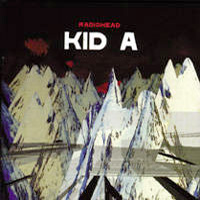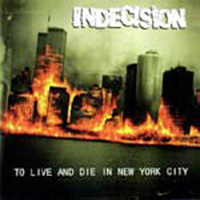 Radiohead
Radiohead
Kid A (EMI)
by Tim Den
Before tackling this record, I realized several things. 1) With all the hype that’s been going on, what I say won’t mean diddly squat. 2) Everyone seems to think they “know” or “understand” Radiohead and how the band is “stretching the limits of rock,” but they’re wrong. This band’s imagination and their motivations are not ours to comprehend. We do not know how their personalities made them decide to take the “weird” approach in following up OK Computer because we are not them. With their past track record and as they’ve shown us time and time again through interviews, they’re deeper than our consumer-based predictions. Whereas we’re able to penetrate through lesser acts in the same situation (don’t tell me you don’t know why members of established bands “break out of the mold” into the likes of Methods of Mayhem. One word: Korn), we can merely interpret Radiohead’s efforts with our own background experiences. 3) In accordance with #2, I will not try to identify why Radiohead has gone and made a non-linear, non-structured album.
 Let me say this, whether or not certain individuals agree on the title, Radiohead is considered “The Greatest Rock Band” of our generation. Prophetic, leading, cutting-edge imagination that had only been credited to The Beatles before them. Radiohead have transcended musical genres and become popular culture icons. Symbols of progress and fearless experimentation, of the Thinking Man’s triumphant next step in human evolution. And they got there for a reason. Whether or not you enjoy Kid A‘s hypnotic, repeating motifs, avant garde horns, and digital cut-and-paste is up to you, but there’s no denying that this new album further solidifies the band’s ability to challenge listener participation. Their ability to dodge categorization just as their old albums spawned entire genres (I’d love to get ten cents every time a band’s bio claims they sound “OK Computer-esque”) is unparallelled. Only time will tell if Kid A will play host cadaver to millions of mediocre maggots trying to embed “electronic dabblings” into their “new sound” (gee, I wonder what the emo kids are gonna try to do next), but one thing’s for certain: Radiohead will have moved on by then, into something radically different but no less revolutionary.
Let me say this, whether or not certain individuals agree on the title, Radiohead is considered “The Greatest Rock Band” of our generation. Prophetic, leading, cutting-edge imagination that had only been credited to The Beatles before them. Radiohead have transcended musical genres and become popular culture icons. Symbols of progress and fearless experimentation, of the Thinking Man’s triumphant next step in human evolution. And they got there for a reason. Whether or not you enjoy Kid A‘s hypnotic, repeating motifs, avant garde horns, and digital cut-and-paste is up to you, but there’s no denying that this new album further solidifies the band’s ability to challenge listener participation. Their ability to dodge categorization just as their old albums spawned entire genres (I’d love to get ten cents every time a band’s bio claims they sound “OK Computer-esque”) is unparallelled. Only time will tell if Kid A will play host cadaver to millions of mediocre maggots trying to embed “electronic dabblings” into their “new sound” (gee, I wonder what the emo kids are gonna try to do next), but one thing’s for certain: Radiohead will have moved on by then, into something radically different but no less revolutionary.
After listening to all their records relentlessly, I still don’t feel that anyone of us has the right to claim “understanding” of this band. All I understand is that this failure of ours to comprehend Radiohead’s growth is exactly what got them their status.



